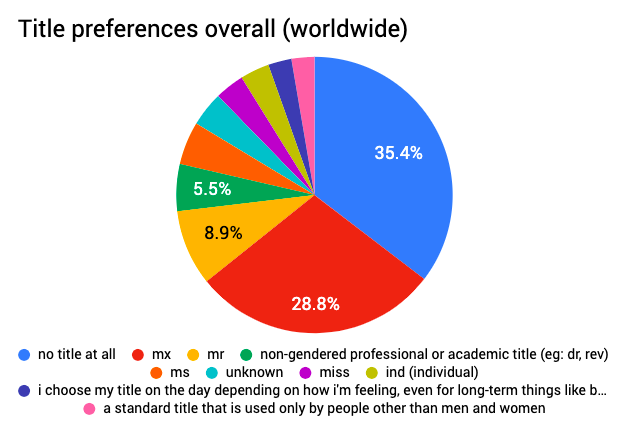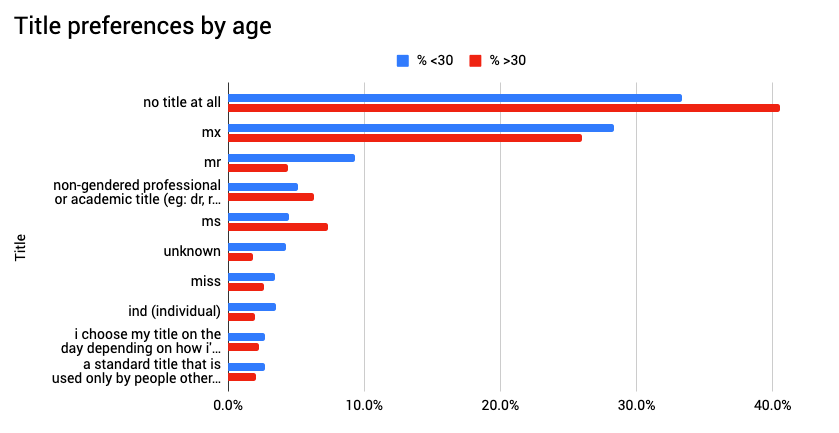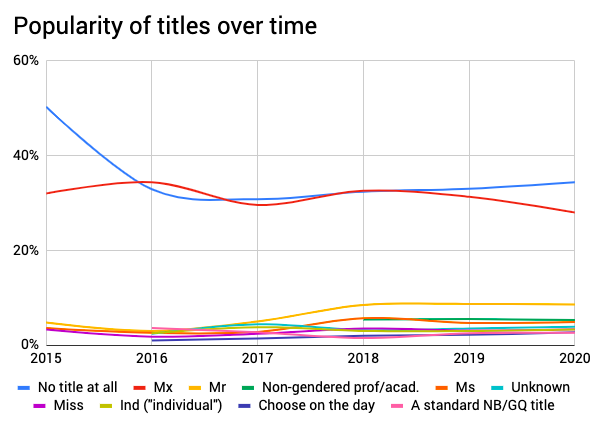This year’s Gender Census, aimed at everyone whose gender(s) or lack thereof are not adequately described by the gender binary of “always, solely and completely male OR always, solely and completely female”, was open from 12th February until 7th April 2020. There were 24,576 usable responses. You can get to the spreadsheet of responses via the full report.
This report will summarise the responses for the second question, regarding honorific titles.
As in previous years, I asked:
Supposing all title fields on forms were optional and write-your-own, what would you want yours to be in English?
(Please note that you should currently be entitled to use it – for example, you should only enter Dr if you have a doctorate.)
There were 10 radio-button options presented in a random order, based on which answers were chosen by over 1% of participants last year:
- No title at all
- Mx
- Mr
- Non-gendered professional or academic title (eg: Dr, Rev)
- Ms
- Unknown
- Miss
- Ind (individual)
- I choose my title on the day depending on how I’m feeling, even for long-term things like bank accounts
- A standard title that is used only by people other than men and women
Here’s a graph of the results:

- No title at all – 34.4% (up 1.4%)
- Mx – 28.0% (down 3.3%)
- Mr – 8.6% (down 0.1%)
- Non-gendered prof/acad. – 5.3% (down 0.2%)
- Ms – 4.9% (up 0.2%)
- Unknown – 3.9% (up 0.4%)
- Miss – 3.3% (up 0.2%)
- Ind (“individual”) – 3.3% (up 0.3%)
- Choose on the day – 2.7% (up 0.5%)
- A standard NB/GQ title – 2.6% (up 0.1%)
This year I collected rough information about age, in order to add type-ins that went over 1% among under-30s and/or over 30s, which means I was able to create this graph:

Some notes:
- People over 30 were a lot more likely to prefer no title over Mx, but no title was preferred across the board.
- Mr was more popular among under-30s, and Ms was more popular in over-30s.
- People under 30 were more likely to choose “unknown”.
- Over-30s were more likely to claim a non-gendered professional or academic title, such as Dr, Reverend, military titles, etc.
The most popular type-in title was M, with 40 entries (0.2%).
This is all fairly consistent with previous results, and nothing reliably stands out as particularly noteworthy on a long-term scale. Here’s the graph of how it compares to previous years:

You can see that the first two or three years are a bit squiffy, while we found our feet and added all the title options that needed to be there. (As we added options, “no title” became less popular.) Things settled down a lot from 2018 onwards, one year after the last title option was added. Identity words tend to fluctuate in popularity, as do pronouns, but titles are for some reason very consistent from year to year.
If you look at the pattern over the six years shown in the graph, Mx and “no title” have swapped places until the last two years, when Mx has been in decline – while titles such as Mr and Ms are increasing. Anecdotally, Mx has certainly been the “default” nonbinary title here in the UK, so I am wondering whether the dramatic increase in participants (11,000 last year, to 24,000 this year) might be a factor, as the survey leaves the geographical and social media bubbles more every year. Perhaps Mx is less popular further afield and outside of that bubble? I am curious to see what happens over the next few years. If I am able, this year I will make a UK-only report to find out how Mx has fared in the UK alone.
No typed titles were entered by over 1% of participants, so there will be no additions to the radio button list next year. All the provided specific titles were selected by at least 3% of participants in at least one of the under-30 and over-30 age groups. “I choose my title on the day” and “a standard nonbinary-exclusive title” have both been fluctuating at just under 3% for some years, but the title list is relatively short and those options will become very difficult to count if I don’t provide a pre-typed option for people, so I won’t remove them from the list next year.
The option “a standard title that is used only by people other than men and women” is also quite useful for further investigation. (I refer to it as a hypothetical “standard nonbinary-exclusive title” for convenience, but obviously one doesn’t need to identify as nonbinary to claim it and if the most popular identity word shifts from nonbinary to something else I will refer to it with the newly-popular word.) It sends relevant participants to a question that asks what that title is or might be.
641 participants (2.6%) said they preferred a standard nonbinary-exclusive title. When they did, they were taken to this question:
In the previous question you chose “a standard title that is used only by people other than men and women.” If you know of any, please type them here. This question is optional.
The participant was then presented with five textboxes. About 12% of participants who saw that question had something to type, and the following titles were entered more than once:
- Mx (26 times)
- M (4 times)
- Friend (2 times)
That’s a title that is established as one that can be used by anyone regardless of gender, a title that is masculine in French, and a very familiar word that would be used specifically in a quite formal context.
Ind (”individual”) could fit the nonbinary-exclusive title niche if it were to be used that way consistently, and I could see it happening, but it has also consistently been claimed by only about 3% of participants since the survey began. It seems that we don’t have a nonbinary-specific title to stand alongside Mr and Ms yet.
So, this year there is not much to report! Only a slight decline in the popularity of Mx, which could reflect survey-related factors, so I will hold off on making any assertions until we have a few more years of data.
As always, these results support the important point that when designing a form the title field should always be optional. One third of participants in this survey have preferred to have no title at all for many years, so any nonbinary title-related campaigning should demand that title questions be optional in addition to adding Mx to the list.
Thanks for reading! If you enjoyed it and would like to give something back, you could increase your chances of taking part in future surveys by following on Tumblr, Twitter or the Fediverse, or subscribing to the mailing list. Alternatively, you could take a look at my Amazon wishlist.
2020-09-22
email: hello@gendercensus.com